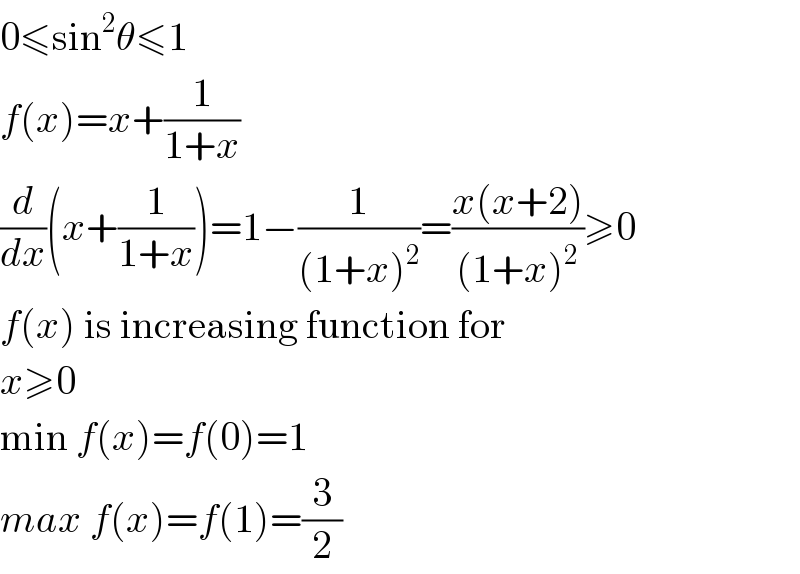
Question Number 16089 by Tinkutara last updated on 17/Jun/17
![The range of function f(θ) = sin^2 θ + (1/(1 + sin^2 θ)) is (1) [1, ∞) (2) [2, ∞) (3) [1, (3/2)] (4) [(3/2), ∞)](Q16089.png)
$$\mathrm{The}\:\mathrm{range}\:\mathrm{of}\:\mathrm{function} \\ $$$${f}\left(\theta\right)\:=\:\mathrm{sin}^{\mathrm{2}} \:\theta\:+\:\frac{\mathrm{1}}{\mathrm{1}\:+\:\mathrm{sin}^{\mathrm{2}} \:\theta}\:\mathrm{is} \\ $$$$\left(\mathrm{1}\right)\:\left[\mathrm{1},\:\infty\right) \\ $$$$\left(\mathrm{2}\right)\:\left[\mathrm{2},\:\infty\right) \\ $$$$\left(\mathrm{3}\right)\:\left[\mathrm{1},\:\frac{\mathrm{3}}{\mathrm{2}}\right] \\ $$$$\left(\mathrm{4}\right)\:\left[\frac{\mathrm{3}}{\mathrm{2}},\:\infty\right) \\ $$
Commented by prakash jain last updated on 18/Jun/17

$$\mathrm{0}\leqslant\mathrm{sin}^{\mathrm{2}} \theta\leqslant\mathrm{1} \\ $$$${f}\left({x}\right)={x}+\frac{\mathrm{1}}{\mathrm{1}+{x}} \\ $$$$\frac{{d}}{{dx}}\left({x}+\frac{\mathrm{1}}{\mathrm{1}+{x}}\right)=\mathrm{1}−\frac{\mathrm{1}}{\left(\mathrm{1}+{x}\right)^{\mathrm{2}} }=\frac{{x}\left({x}+\mathrm{2}\right)}{\left(\mathrm{1}+{x}\right)^{\mathrm{2}} }\geqslant\mathrm{0} \\ $$$${f}\left({x}\right)\:\mathrm{is}\:\mathrm{increasing}\:\mathrm{function}\:\mathrm{for} \\ $$$${x}\geqslant\mathrm{0}\: \\ $$$$\mathrm{min}\:{f}\left({x}\right)={f}\left(\mathrm{0}\right)=\mathrm{1} \\ $$$${max}\:{f}\left({x}\right)={f}\left(\mathrm{1}\right)=\frac{\mathrm{3}}{\mathrm{2}} \\ $$
Commented by Tinkutara last updated on 18/Jun/17

$$\mathrm{Thanks}\:\mathrm{Sir}! \\ $$
